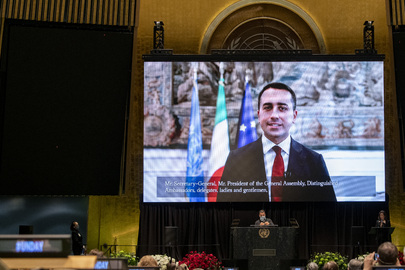
Zoom, Zoom, Zoom: AMUN and a Pandemic

No one can say 2020 hasn’t been a wild year, and all of us have had to adapt to the new world in vastly different ways. One of the most personal ways our lives have changed is by moving most, if not all, of our professional and social interactions to video chatting, either by Zoom, MS Teams, Skype, and many similar platforms. Before, we went to classes and sat in conference rooms to meet at work, and now we are broadcasting ourselves from the comfort and privacy of our own homes.
Doing so offers a unique glance into our lives.While the camera is pointed on us, the room and the stuff that we surround ourselves with becomes as visible as day in these video chats. All of our actions while on camera, whether it’s a roll of the eye or cooking during class, are visible, and the overall dynamic of class and work has fundamentally changed. We interviewed several AMUN staffers to get an idea of how life has changed now that they are largely spent in front of a video camera.
Among the most popular things to do has been to cultivate a video space and background. Some have spent quite a bit of time curating their background, and some others have spent literally zero minutes thinking about it. Our staff has included in their video backgrounds things such as cultural masks, art posters, inspirational quotes, and even an Eleanor Roosevelt doll, which draws quite a bit of side discussion whenever it is visible. Some simply turn their computer video cameras towards a more flattering wall or against bookshelves. Windows are frequently in backgrounds, though backlighting is a potential problem. Overall, the key takeaway from several interviews was an understanding that your background reflects you to those who see it, and everyone should take a moment to see their background from the perspective of their audience, whether it is a virtual happy hour with friends, a class, or a job interview.
When asked about how life has changed in front of a camera, several respondents noted how life must go on despite being on camera all day long, and indeed life does continue on. One staffer shared that she dropped her laptop while cooking pasta, only to then drop the pasta on the floor, nearly dousing their laptop in boiling pasta water. Thankfully, the laptop survived that ordeal. Another remembers watching someone’s cat knocking the laptop over off the desk to crash to the ground before disconnecting.
And our Associate Executive Director, Jacqueline Whitt, recalled the travails of a colleague, now known all over the world as “BBC Dad,” whose kids burst in the room while he was doing an on-camera interview. At the time (way back in 2017), it seemed crazy that this would happen. But now, it is an almost-daily occurrence as people work from home. And our expectations of what it means to be “professional” are changing. Whether for the worse or better is still up for debate.
As we spend more and more time in front of a camera, we move away from the traditional formality and begin to relax in the spotlight. Though, one staffer did give a note of warning: don’t put your camera on when you are taking a conference call from bed. Go audio only, unless you think you might start snoring.
Keep Up With The Accords
More to read
The AMUN Accords is a premier resource for fact-based Model United Nations simulations. We are always looking for new contributors. Want to write for the AMUN Accords? Check out out the submission guidelines and then get in touch!




